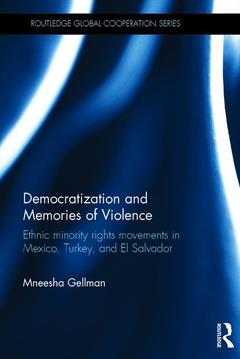Democratization and Memories of Violence Ethnic minority rights movements in Mexico, Turkey, and El Salvador Routledge Global Cooperation Series
Auteur : Gellman Mneesha

Ethnic minority communities make claims for cultural rights from states in different ways depending on how governments include them in policies and practices of accommodation or assimilation. However, institutional explanations don?t tell the whole story, as individuals and communities also protest, using emotionally compelling narratives about past wrongs to justify their claims for new rights protections.
Democratization and Memories of Violence: Ethnic minority rights movements in Mexico, Turkey, and El Salvador examines how ethnic minority communities use memories of state and paramilitary violence to shame states into cooperating with minority cultural agendas such as the right to mother tongue education. Shaming and claiming is a social movement tactic that binds historic violence to contemporary citizenship. Combining theory with empirics, the book accounts for how democratization shapes citizen experiences of interest representation and how memorialization processes challenge state regimes of forgetting at local, state, and international levels. Democratization and Memories of Violence draws on six case studies in Mexico, Turkey, and El Salvador to show how memory-based narratives serve as emotionally salient leverage for marginalized communities to facilitate state consideration of minority rights agendas.
This book will be of interest to postgraduates and researchers in comparative politics, development studies, sociology, international studies, peace and conflict studies and area studies.
1. Why Communities Shame and Claim 2. Memory, Violence, and Shaming and Claiming in Acteal, Chiapas, Mexico 3. The Fight for Triqui Autonomy in San Juan Copala, Oaxaca, Mexico 4. Turkey: Memory, "Mountain Turks," and the Politics of Turkification 5. Armenians and the "G" Word in Turkey 6. Nahuas in El Salvador: Negating "Pupusas" But Eating Them Too 7. Cultural Erosion: Fragile Lenca Persistence in Morazán, El Salvador 8. Dynamics of Shaming and Claiming in Comparative Perspective 9. Conclusion: Memory Matters in Shaming and Claiming
Mneesha Gellman is Assistant Professor of Political Science at Emerson College, Boston, USA.
Date de parution : 08-2016
15.6x23.4 cm
Date de parution : 04-2018
15.6x23.4 cm
Thèmes de Democratization and Memories of Violence :
Mots-clés :
Armenians; Kurds; citizenship; ethnography of the state; language; massacre; memory; Las Abejas; minorities; Cultural Rights; Human Development Indices; Pueblos Originarios; NGO Worker; Hrant Dink; Alevi Kurds; Spanish Language; EU Membership Process; El Salvador’s Civil War; Hrant Dink Foundation; Nahua People; PRI Rule; Pan American Health Organization; Acteal Massacre; Nahua Community; Kurdish Language; Oaxaca City; Extra-institutional Mobilization; Nahuat Language; Van Bruinessen; Intercultural Education; Turkish Language Media; Istanbul Policy Center; Autonomy Declaration



